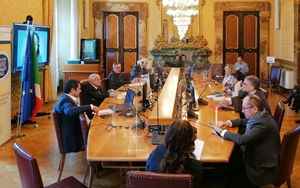(Finance) – “Italy is a country split into 4. Alla North-South historical fracture In recent years, there has been added that between large metropolitan areas and inland areas that include fragile territories, far from the main centers of supply of essential services and too often abandoned to themselves. AND it is essential to implement the cross-cutting priority of the NRPR which identifies among the objectives the recovery of the penalizing historical delays affecting people with disabilities, young people, women and the South “.
He said it Tiziano Treu, president of the CNELspeaking today at the seminar “Proximity, beyond real vs virtual. Digital infrastructures, agile work and territorial, gender and generational differences. Systemic impact assessments, critical issues and proposals”, first appointment in the cycle of meetings on “Proximity and citizenship gap “promoted byCNEL Observatory on Urban Territorial Policies in collaboration with theUniversity of Florence.
The truest and most authentic Italy, whose primary need is to still be able to reside there, or to return, is that of small towns that cover a total of 60% of the entire surface of the national territory, 52% of the Municipalities and 22% of the population.
“The new North-South gap translates, even before the differences indicated by the economic indicators, into the inequality of living conditions and opportunities, especially for the new generations. This fact translates into the perception of citizens of the” internal “areas. to enjoy a sort of “limited citizenship”, characterized by the failure to guarantee essential levels of performance. This limitation affects the social stability of the area and represents the first constraint to the expansion of the productive fabric and the attraction of new investments “, he has declared Maurizio Savoncelli, CNEL councilor which was followed by the intervention of Saverio Mecca of the University of Florence according to which “The most significant gaps, according to the latest Court of Auditors data, are in the essential levels of health care (LEA), in infrastructure, in employment, in welfare and the most penalized continue to be young people and women. Current health expenditure accounts for 75.81% of total current expenditure at national level and reaches 84.38% of incidence in RSOs and 48.23% in the RSS and shows an increase of 2.94% in the three-year period, in line with the growth in total current expenditure (+ 2.48%) “.
“With the Quota Sud we have ensured 82 billion euros for our territories from the PNRR. We are also involved in programming the FSC, which provides for an allocation of 73.5 billion of which 80% will go to the South. We have implemented structural interventions aimed at supporting local authorities and strengthening their planning capacity. The funds for the development of the South are there, the challenge is to spend these resources and invest them in favor of territorial growth. To restart the South, and therefore Italy, is institutional cooperation at all levels is essential “, he stressed Dalila Nesci, Undersecretary for the South.
“Supporting and promoting a greater presence of women in the STEM sectors is a priority for Europe which, however, must be included in the national and regional plans for guidance, training and inclusion in the labor market – he noted. Irene Tinagli, Chair of the EU Economic and Financial Affairs Committee – In the last ten years in Italy progress has been made, we see an increase in the number of girls who enroll in technical-scientific faculties but it is still advancing too slowly. We need a transversal commitment in our country, which also starts simply from a greater promotion of technical-scientific culture, and not only in schools. The world of media, communication, politics: in all these areas, technical-scientific skills are very rare and it is a huge problem which is then reflected in the public debate and public policies. On this issue we must reflect and intervene with greater incisiveness “.
For Elena Bonetti, Minister for Equal Opportunities and the Family“Italy in 2027 will not only have achieved the objectives we have set for ourselves on eliminating gender inequality, but it will also be an Italy that will rethink its own country in a structural way. The theme of enhancing diversity, in a a future that enables everyone to express their potential is a key step for sustainable development “.
Today’s work, organized with the Department of Human Sciences for Education of the University of Milan Bicocca, ended with a round table moderated by Pina Debbi, deputy director of Tg La7, which was attended by Tiziano Treu, Marco Bentivogli, Mariano Corso, Maurizio Decastri, Stefano Moriggi, Fiorella Crespi and Barbara Quacquarelli, in the presence of the secretary general of the CNEL Mauro Nori.
